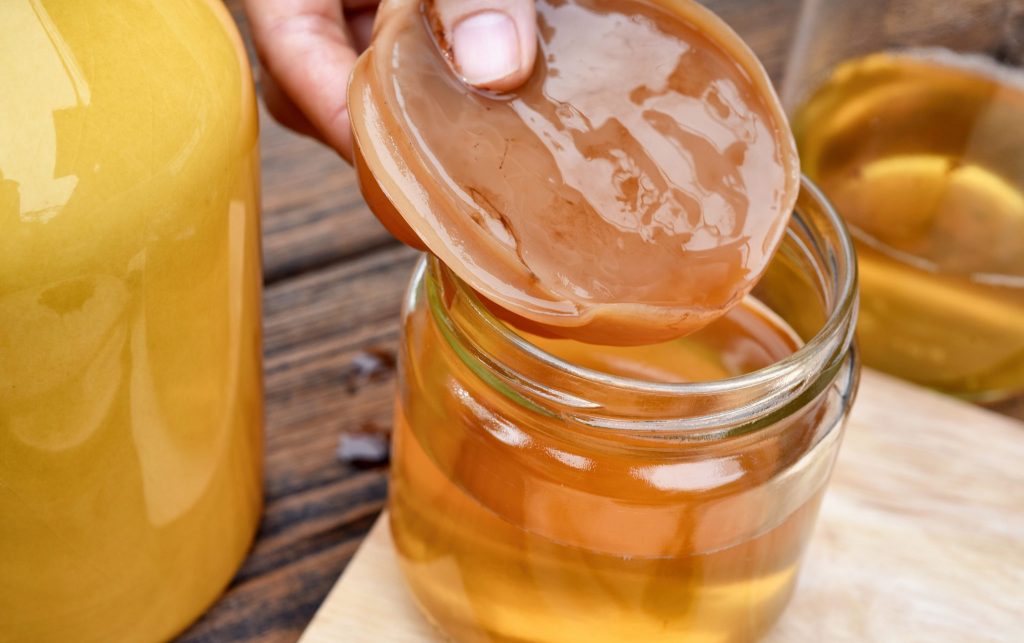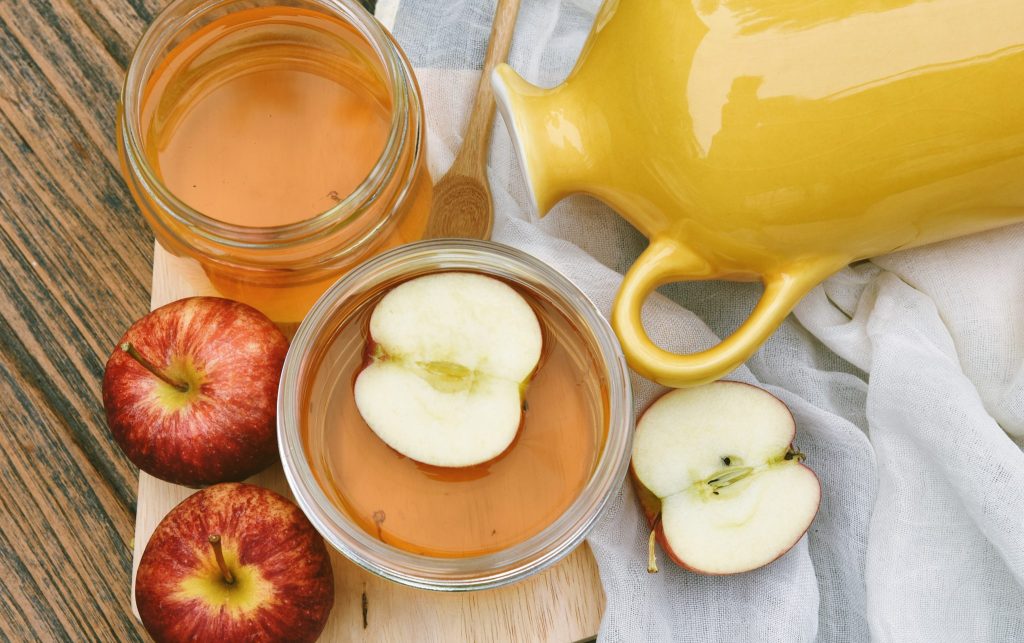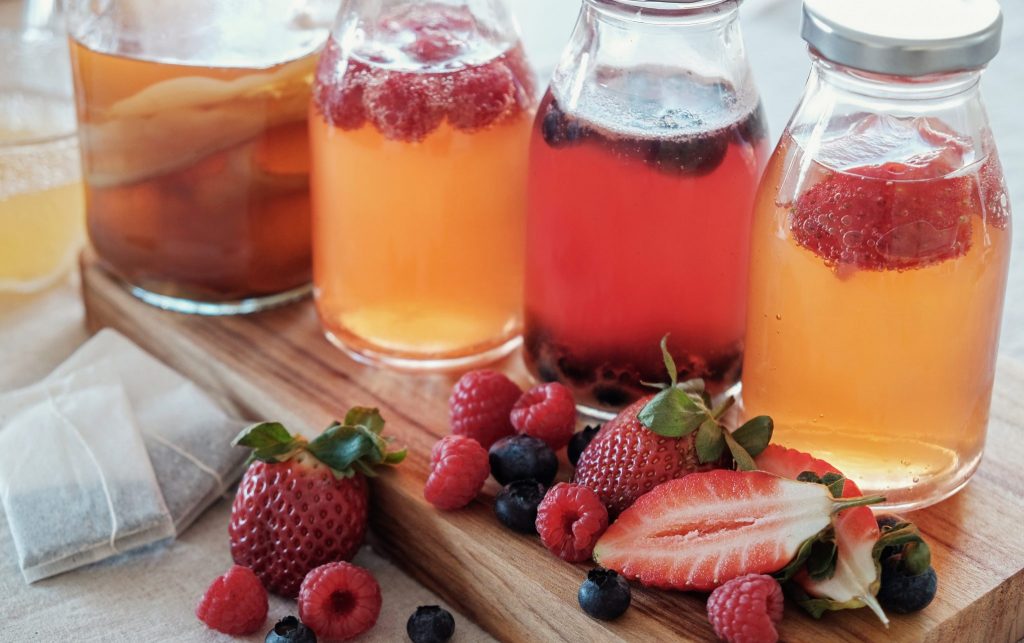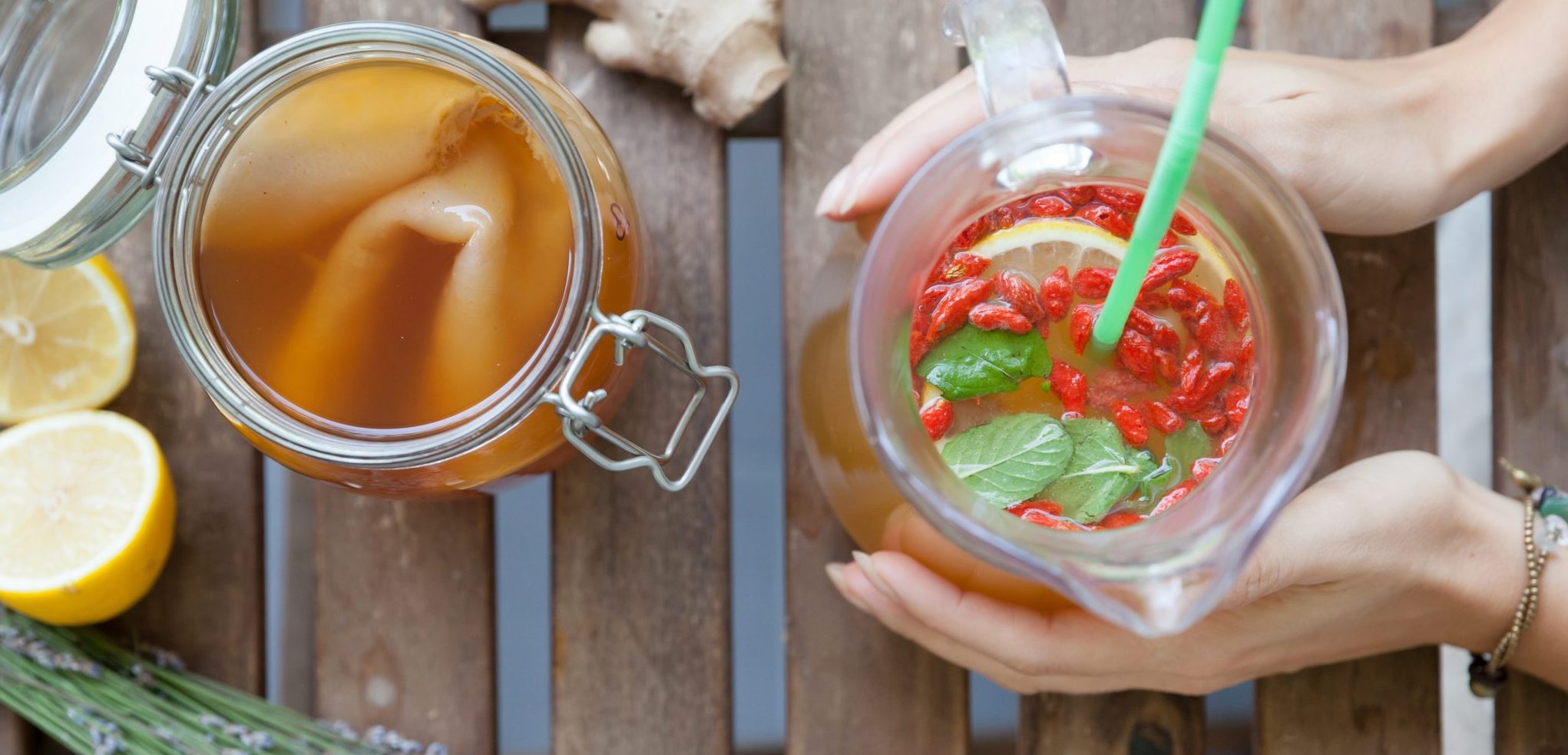Fermented tea might not be everyone’s, well, cup of tea, but it certainly has been making headlines. Kombucha isn’t the new kid on the block, its supposed benefits have long been known in the health and fitness community, but it’s only in recent years that it has gone mainstream. With such potential benefits as better gut health and weight loss thrown around, it’s high time to dive in and discover – is kombucha actually good for you or is it just another dietary trend?
In this article, we’ll uncover the truth behind:
- What is kombucha and how is it made?
- How does kombucha supposedly work (and if it actually does)?
- Is it healthy or not to drink this fermented liquid?
What is kombucha and how is it made?

Simply, kombucha is a drink made from sugary green or black tea that is then fermented using a scoby – a symbiotic culture of bacteria and yeasts. This is a formation that looks like a goopy disk, that allows your kombucha drink to form and ferment correctly.
Although, in general, the drink has a sour taste, depending on the producer, it can also have a variety of undertones from fruity, tarty, floral, spicy or herby, that make it more palatable.
It is made using the following process:
- Sugary tea is brewed in boiling water and left to cool.
- Scoby is then added, and the concoction is left to ferment for around seven days.
- The mixture should now be poured into a different airtight (and clean) container with some additional sugar added. This is left for a couple of days. For a fizzier, more fermented mixture, leave for longer.
- Afterward, the drink is ready; you can now add some flavorings, such as spices to suit your taste.
Kombucha is a fermented drink made from sugary tea and a cultured glob, known as a scoby, which allows it to healthily ferment.
How does kombucha really work?

We’re conditioned to believe that we shouldn’t eat food that’s gone off or fermented, and in general, this isn’t a bad rule to live by, so why should we drink kombucha, then?
In recent years, fermented foods have been making headlines for their health-improving properties. Fermented products such as kombucha are said to be a good source of probiotics that help to improve gut health and digestion. Aside from kombucha, these include kefir, sauerkraut, pickles, kimchi, and apple cider vinegar.
For example, the Japanese diet, which includes such foods as miso, natto, soy sauce, is said to contribute to the nation’s long lifespan and good health.
So, back to the main question – how does the drink work?
Kombucha is confirmed to be rich in probiotics, which promote a healthy gut microbiome.
As the body’s microbiome is so diverse, containing over 40 trillion bacteria, it is an essential component in overall health. Even Hippocrates, the Ancient Greek physician, believed that “all diseases begin in the gut.”
Through medicine has progressed since then, it seems there is some truth to the expression, with links to various conditions, including depression, slow metabolism, unexplained weight gain, inflammation and more, linked to the state of the microbiome.
While kombucha’s probiotics might not be a one-stop-shop solution, they can go some way to improving health.
Kombucha is rich in probiotics, which promote a healthy balance in the body’s microbiome.
So, is kombucha healthy or not?

The consensus is that “YES” kombucha is a healthy drink that can be consumed to help promote body health. Here’s why:
Kombucha helps regulate bacteria
Back to that probiotic argument. This beverage has the potential to regulate the good and bad bacteria in your body. Recent studies have shown it may even be helpful in fighting the Candida strain.
May aid in blood sugar level management
While we’re not suggesting it’s a cure for diabetes, adding kombucha to your diet may help your body reduce the amount of sugar that enters the bloodstream. Studies in animals show the beverage aids in suppressing increased levels of sugar in the blood, which could potentially help in the treatment of diabetes.
Can help lower the risk of disease
Early laboratory studies have shown that kombucha may be helpful in lowering the risk of diseases such as cancer. Its antioxidant properties could help to reduce the growth and spread of the disease in the body.
If you’ve developed a taste for it, kombucha may be a healthful beverage that helps to maintain blood sugar levels, regulate bacteria, and lowers the risk of disease.
Are there any negatives?
While there are some significant upsides to consuming this fermented drink, it might not be suitable for everyone. These are the most important ones to be aware of:
- Kombucha is mildly alcoholic; its alcohol content can vary from 0.5% to 3% with homebrews tending to contain higher levels. This and the fact that the drink is unpasteurized is why it’s not recommended for pregnant women and those who are breastfeeding.
- Those with kidney disease, cancer, and HIV, should exercise care with this liquid due to its lack of pasteurization which makes those with a suppressed immune system more susceptible.
- Although it isn’t generally thought of as a high-calorie drink, you might be surprised to learn that one bottle can contain up to 120 of them. Drink it each day, and this is an extra 120 to your diet, which may, in the long run, contribute to weight gain.
- If you’re susceptible to bloating, kombucha might be a drink you might want to place on the avoid list. As it is carbonated from the fermentation process, the beverage can cause bloating and gas in some people, which is not the pleasant, healthy feeling you want.
- Finally, like any tea-based product, this beverage contains caffeine, so if you find yourself “hyped” after a cup of tea, kombucha may just produce the same effect. This is also important if you are on a reduced caffeine diet or have other interactions that you need to steer clear of.
For pregnant women, those with a suppressed immune system, and those sensitive to caffeine, it might be best to place kombucha firmly at the top of your “avoid” list.



